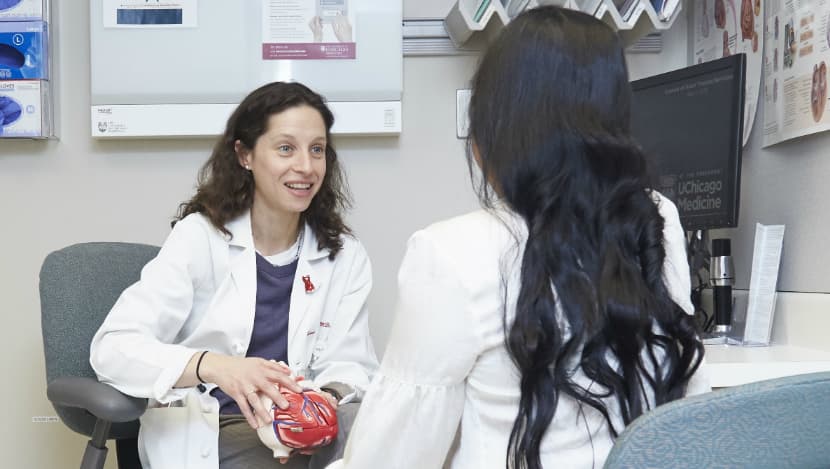Cardiologists guide at-risk patients through cancer treatment

Heart disease on its own is a serious medical condition, but when combined with cancer, it can create additional complications. Furthermore, aggressive cancer treatments can increase strain on the heart.
To address these unique needs, interdisciplinary programs in cardiology and oncology have cropped up at medical centers around the country in recent years. UChicago Medicine cardiologists Jeanne DeCara, MD, and Tamar Polonsky, MD, were among the first in the Chicago area to develop a cardio-oncology program in 2011.
Working closely with oncologists, they see patients with pre-existing cardiovascular conditions like coronary artery disease or high blood pressure to optimize their heart health. This increases a patient’s chance at receiving all of their cancer treatment safely, whether it be chemotherapy, a stem cell transplant, immunotherapy or surgery.
The cardio-oncology team is able to identify and monitor cardiovascular risk factors that may hinder or complicate cancer treatment, or cardiovascular complications/toxicities that result from cancer treatment.
Many cancer treatments have unintended side effects on the cardiovascular system, such as difficult-to-control high blood pressure, plaque in the arteries, weakening of the heart muscle or abnormal heart rhythms.
The cardio-oncology team uses state-of-the-art imaging techniques to detect early signs of cardiac side effects before more significant complications develop. UChicago Medicine physicians have pioneered many techniques used in cardiac ultrasound (called an echocardiogram) such as 3D imaging. They also have expertise in cardiac magnetic resonance imaging (MRI), another useful tool for monitoring cardiac side effects during cancer treatments.
In many situations, standard heart medications started early on can prevent further damage to a patient’s heart or arteries, thereby allowing the patient to complete a treatment.
"Our goal is to ensure patients receive the best cancer therapy without having to compromise or interrupt their treatment because of a heart condition or cardiovascular side effects," says Polonsky.
The cardio-oncology program works to identify at-risk patients and optimize their heart health so they can undergo cancer treatment safely and without interruption.
For patients whose cancer treatments have ended, they also offer long-term cardiac care and surveillance for any cardiac side effects that may occur later on.
“It’s critically important to identify and modify cardiovascular risk factors as much as possible,” says DeCara. “Equally important is ensuring these patients are getting appropriate surveillance and follow-up care.”
For patients facing cancer, having to juggle an accompanying heart condition can make a critical illness even more complex and stressful. This unique group of patients requires the highest level of expertise and coordinated care to ensure the best possible outcome. Combining cardiology and oncology allows UChicago Medicine to provide individualized cancer care based on each patient’s unique situation.

Cardio-Oncology Program
For patients facing cancer, having to juggle an accompanying heart condition can make a critical illness even more complex and stressful. At the University of Chicago Medicine, we realize this special group of patients requires the highest level of expertise and coordinated care to ensure the best possible outcome.
Learn more about our services.